Coronavirus: Meet Britain's unlikely key workers
- Published
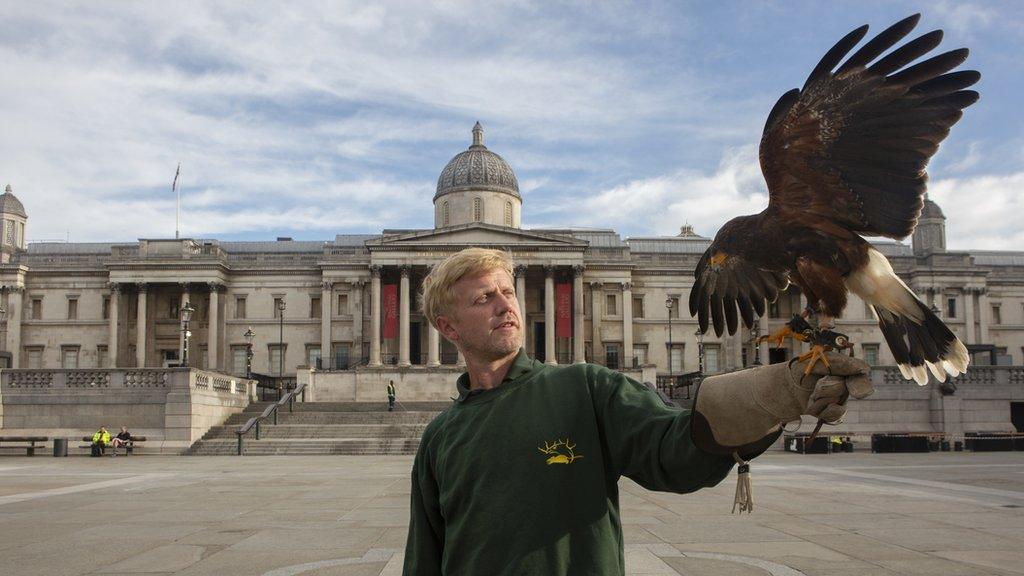
Matt Forward with his hawk in Trafalgar Square
Whether it's nurses, carers or supermarket staff, key workers have rightly been hailed as heroes during lockdown.
But behind the frontline of the pandemic there have been a huge number of people who have been busy doing essential jobs, as outlined by the government, external.
They include those working across the food and transport industries, people providing childcare, working in public service and the financial sector.
They have been allowed to travel to work and send their children to school while the rest of us have been in lockdown. We spoke to some of them to find out how lockdown has been.

The falconer
Matt Forward's job is to keep the pigeons away from Trafalgar Square. Pest management was covered in the key worker list, so throughout lockdown Matt drove himself and his Harris hawk 45 miles to the iconic square early two mornings a week.
From 06:00, his "little boy" Lighten would fly around for a couple of hours - perching on Nelson's Column and the roof of the National Gallery.
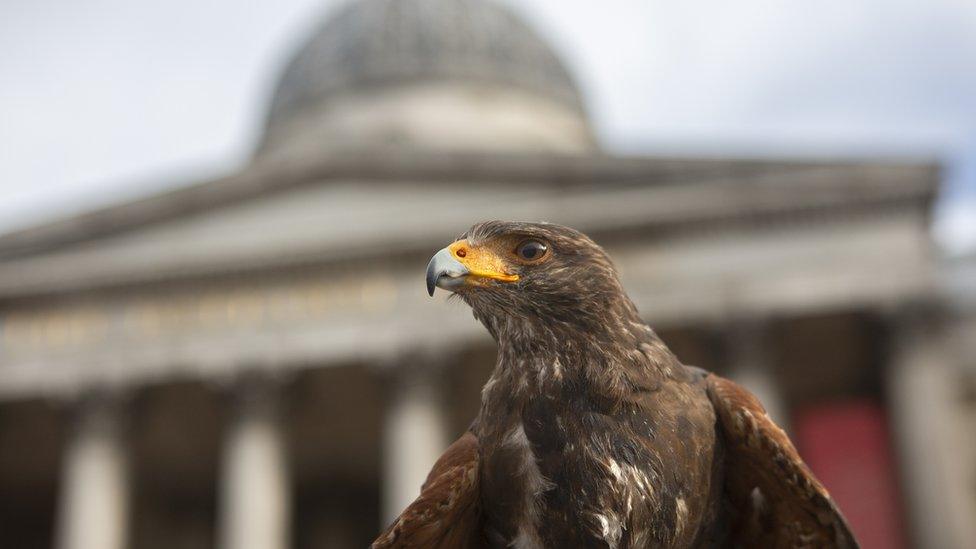
Harris hawks are social birds known for their co-operative manner
His presence alone was enough to keep the pigeons away. "If I was a pigeon and saw this beast flying around everywhere I wouldn't want to nest and get too comfy," he says.
Matt, who lives in Tunbridge Wells, Kent, said he never thought of stopping his job because of lockdown.
"If someone wasn't there doing the job that we do, we'd be overrun," he says. Matt is new to the profession - he swapped his work as a plumber for the "best job in the world" a few months before lockdown.
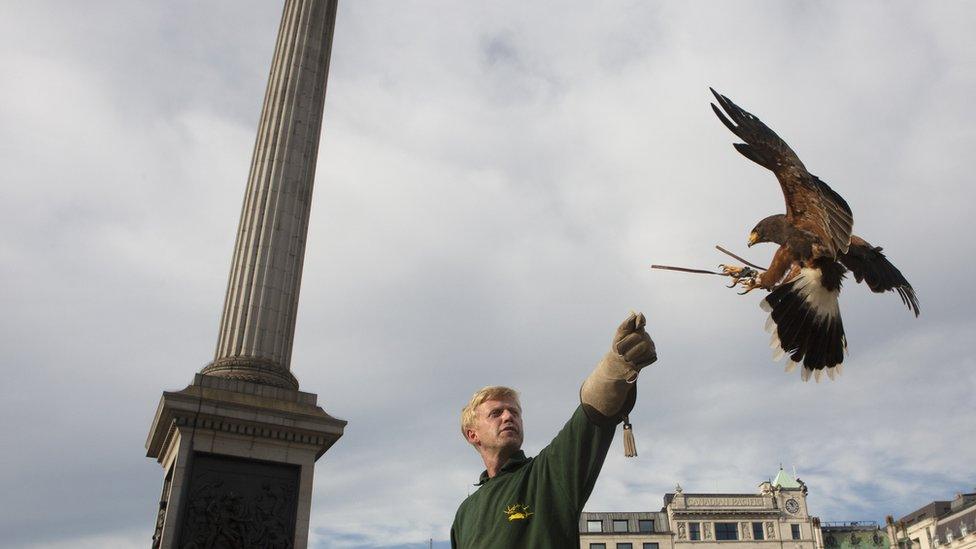
Matt has kept birds of prey all his life, but only recently started getting paid to work with them
He saw a "hell of a difference" during lockdown, particularly because there were fewer people about, meaning there was less food waste for the pigeons to eat. "People aren't dropping bags of crisps in Trafalgar Square anymore," he says, "basically food isn't on a plate for them."
But because there is less food around, it's changed the behaviour of the pigeons. They seem a bit braver because they're hungrier, he says.
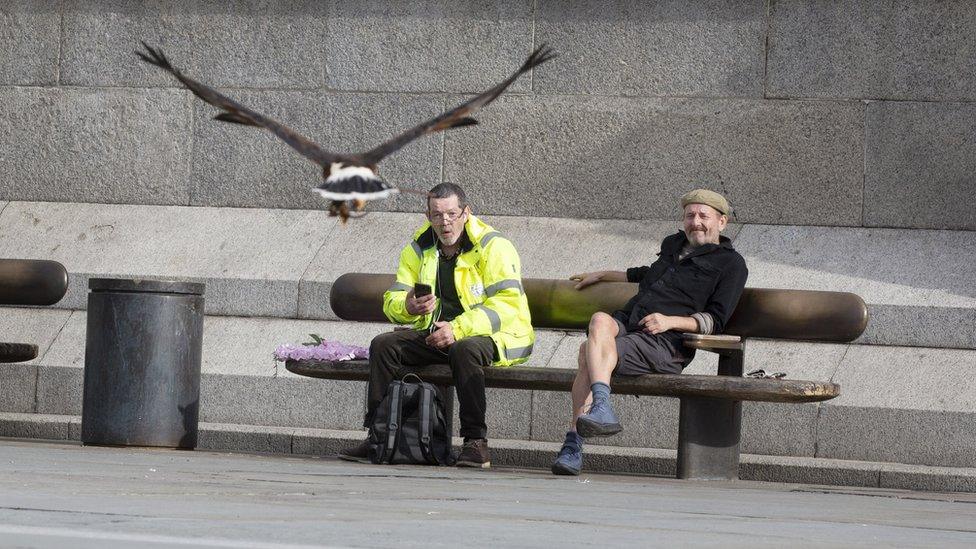
After he finishes in Trafalgar Square, he takes his bird of prey to other places in the capital - London Stadium, museums, hotels.
Matt says he loves that, despite coronavirus, people still come up to him to ask him about what he's doing. "It's not as if I'm walking a dog down the road," he says. "People show a lot of interest in it - that's one of the reasons I love it."

The asparagus farmers
Lockdown has been "a rollercoaster" on Lunan Bay Farm, in Angus. Perched on the eastern coast of Scotland, the farm produces free range goat meat, honeyberries and other niche products. But a third of its business comes from asparagus - which has just a six-week season, running from early May until the middle of June.
"Covid hit us right before our asparagus started," says Jillian McEwan, who runs the farm with her husband Neil, a fifth-generation farmer. "It is a high-intense time because it is such a short season."
As food producers, they also qualified as key workers, but were faced with a race to pick - and then sell - their asparagus right in the middle of lockdown.
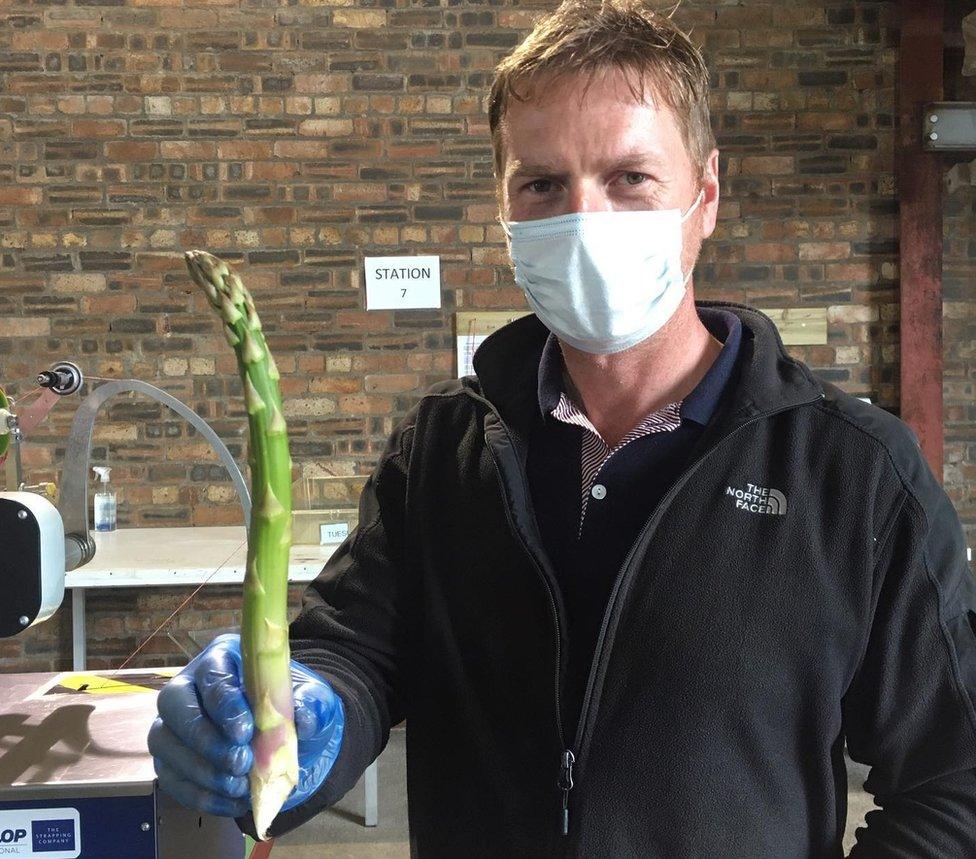
Neil and Jillian usually sell most of their asparagus to restaurants around Scotland
"We were able to booster our workforce with people who had been furloughed or had been made redundant," Jillian says. They ended up with a team of 10-15 pickers, who all had to be equipped with masks, gloves and aprons.
The farm usually uses lightweight tractors in the asparagus fields, with pickers filling baskets on a platform pulled behind it. But to ensure social distancing they needed a much larger platform, meaning a heavier tractor was required.
Jillian worries about the impact the heavier machinery could have in the coming years.
"By compacting the ground it will have an impact on next year's crop. So there were a lot of consequences of Covid for us."
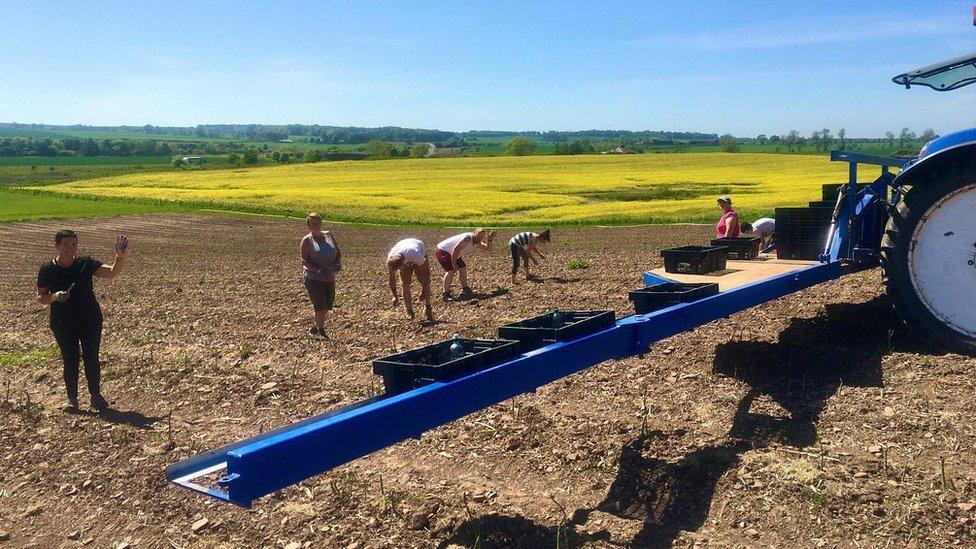
The six-week asparagus season fell in the middle of lockdown
The farm has 15 acres of asparagus and harvested 7,500kg in the six weeks from 4 May. But then came the challenge of finding new customers to sell it to while it was fresh. The 70-plus restaurants who usually take most of it were all closed.
Instead they've turned to small farm shops and independent retailers. Much of their asparagus has been delivered to people as part of veg boxes. "It actually proved to be quite successful for us. We could have actually sold three times the amount of asparagus we produced."

The lock keeper
"I have 62 volunteers that help me run manage the locks," says Alex Goode, site manager at Foxton Locks, in Leicestershire. "I went down to zero at the start of lockdown."
As a key worker, the operation of the area became Alex's responsibility during lockdown.
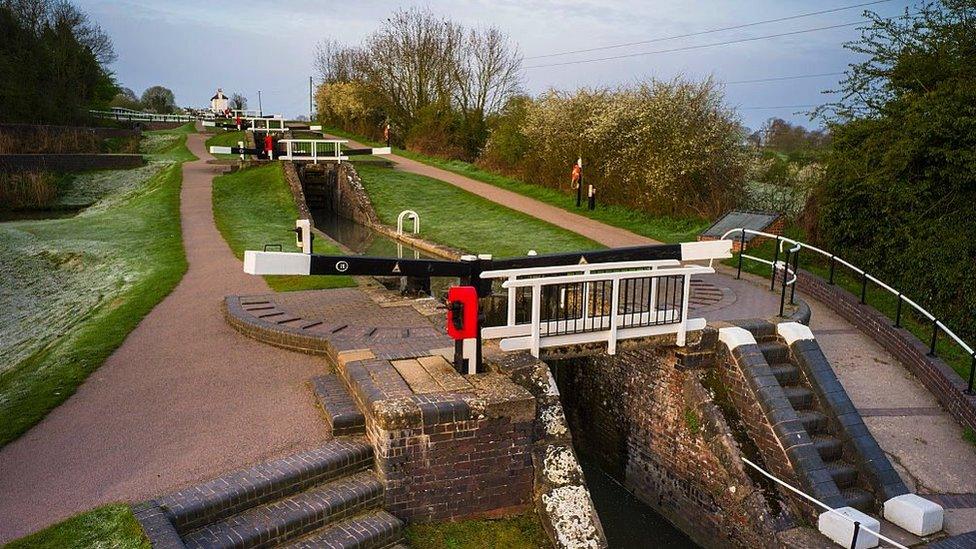
Just a handful of boats a day passed through Foxton Locks during lockdown
Located on the Leicester section of the Grand Union Canal, Foxton boasts the longest and steepest set of staircase locks, external in the UK. It is a set of 10 individual locks, split into two by a passing area. In the height of summer it can see 30-45 boats pass through every day.
With all but essential travel stopped on the canal system at the beginning of lockdown, that number fell to between one and four a day. Yet boaters still needed to pass through the locks.
"People who are living on their boats, it is their house, they still needed to get to areas where they could empty their toilets and fill up their water. Other people needed to move around to get to sick relatives, or to get somewhere to moor for lockdown."
Working mainly from home, he created a next day booking system, where all the boats wanting to pass had to register for a set time the following day, giving Alex time to arrive, unlock the locks, and make sure coronavirus protocols were being stuck to by boaters.
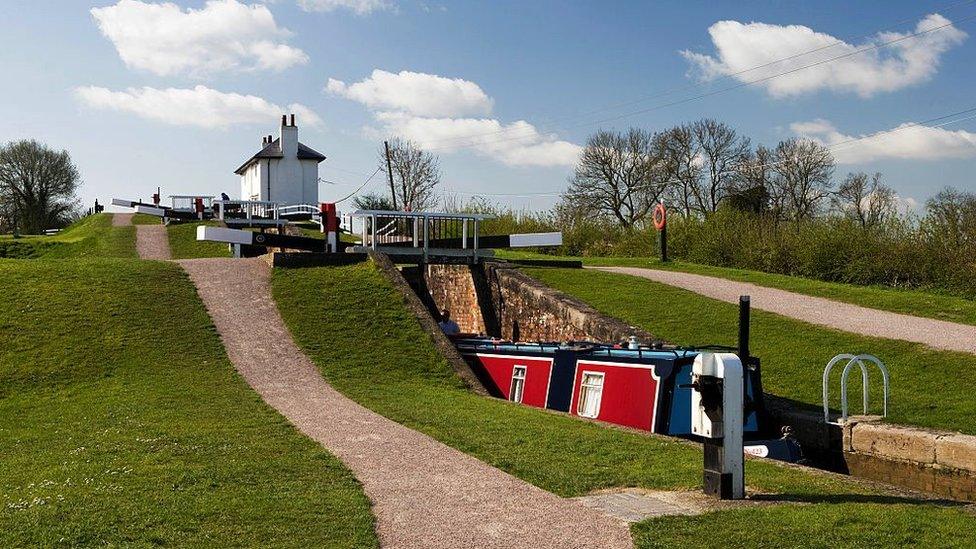
A team of more than 60 volunteers usually help to maintain and run the locks
Alex would also perform a daily safety check to make sure there was no damage or vandalism to the lock - or to the tow path, where locals came for their daily permitted exercise.
He says about 10-15 boats a day now pass through Foxton and he is looking forward to the canal volunteers returning at the beginning of July.

The speech therapist
"It resembled something out of ET," says Caitlin Rehal. The 37-year-old specialist speech and language therapist is describing the personal protective equipment she had to wear to see a 102-year-old patient.
Neither were suspected of having coronavirus, but such PPE is just one of the changes Caitlin has seen in her profession since the pandemic hit.
"It was almost impossible to engage with this patient while wearing all of this gear," she said. "It was very hard to get her to know I was a person trying to speak to her. My impression was it was as if a bin was speaking to her… like something was talking but perhaps it shouldn't be."
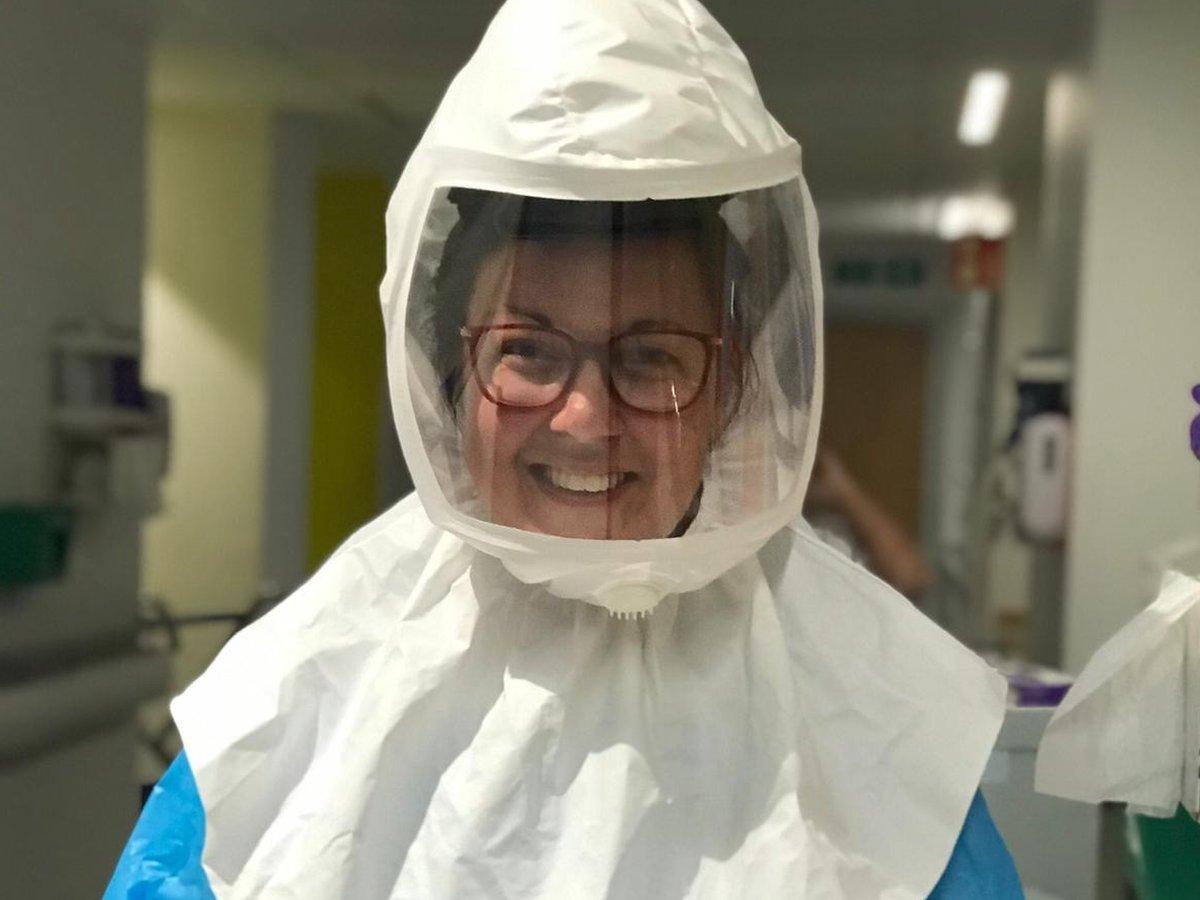
Caitlin says she felt like she was wearing an "ET" outfit
Caitlin says that as the PPE guidance has changed she hasn't been required to wear the "ET" outfit again - now a surgical mask, gloves and an apron are deemed suitable to see patients.
As a specialist health key worker, she has continued to work at Tunbridge Wells Hospital, in Kent, during the pandemic, treating people struggling to communicate or swallow, which affects their eating and drinking.
She says her team regularly sees patients who have had a brain injury, a fall, or those with dementia, Parkinson's or multiple sclerosis. And now Covid-19 - because it affects the respiratory system, it can have an impact on the way people swallow, she says.
"Overall we have had fewer patients but of those patients some of them are much higher risk. So it's been a bit of an adjustment," she says. It's also meant many of the patients her team treats have been younger than usual - aged in their 50s and 60s, rather than 70s and older.
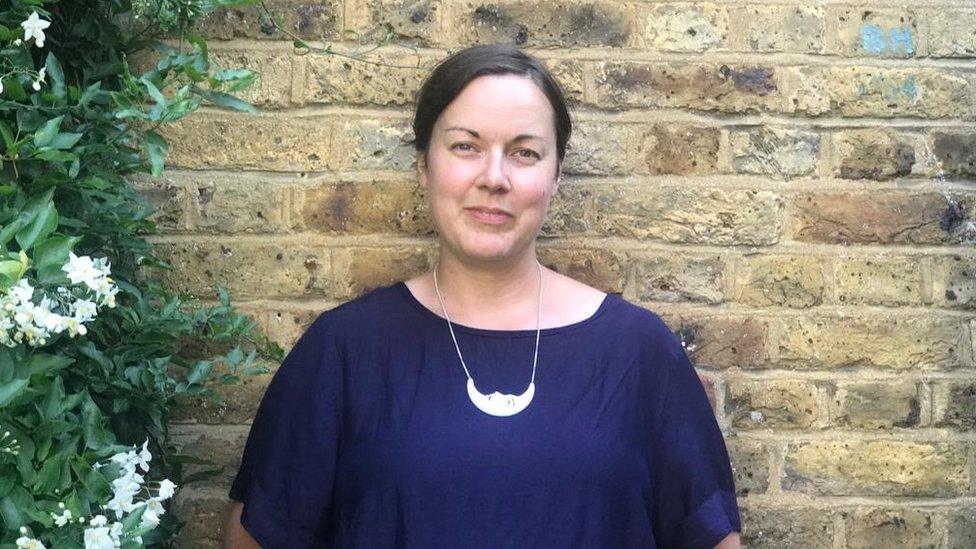
"It's been a bit of an adjustment," says Caitlin
But because she has asthma, Caitlin has been unable to work with many of those higher risk patients. She can't see anyone suspected of having coronavirus, even with elaborate PPE.
She says she's grateful for the support of her colleagues when she felt "she wasn't able to pull her weight". "Their understanding and appreciation of the work I was able to do, in lieu of being able to be on the high-risk wards with them, was very important for my emotional health in a very stressful period."
All photographs are copyrighted.
- Published25 June 2020
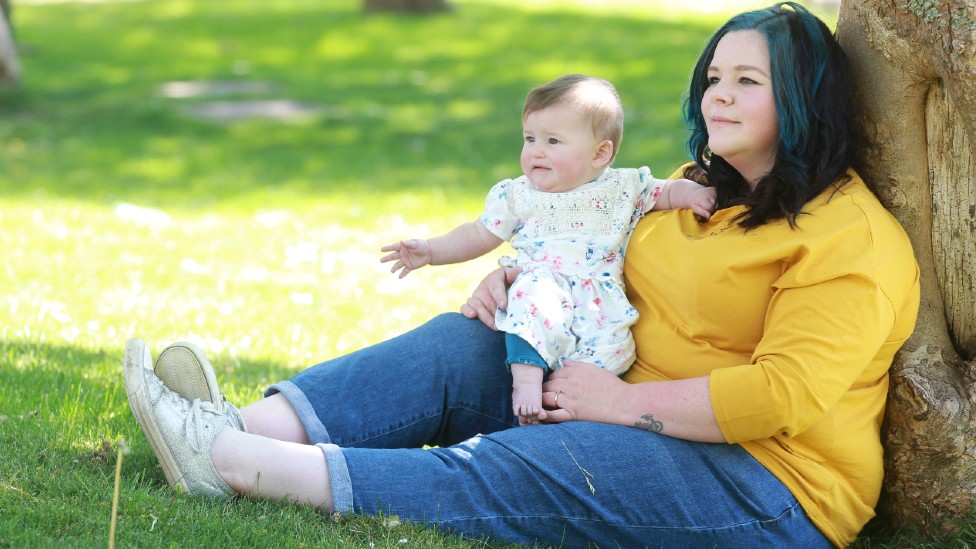
- Published2 June 2020
